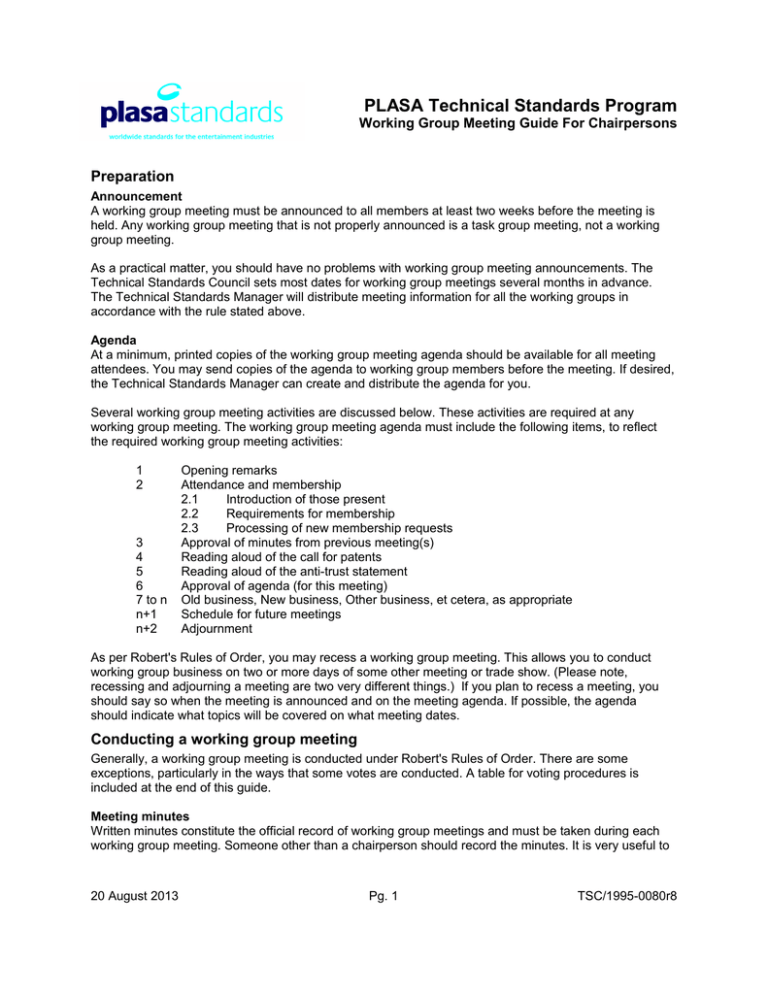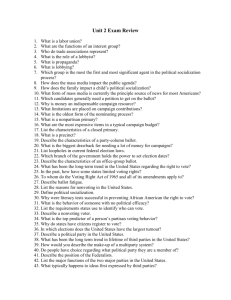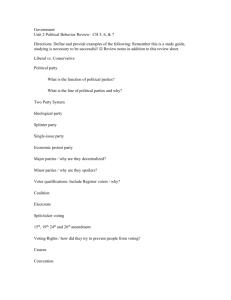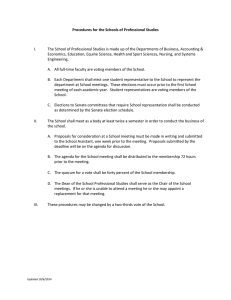Working Group Meeting Guide
advertisement

PLASA Technical Standards Program Working Group Meeting Guide For Chairpersons Preparation Announcement A working group meeting must be announced to all members at least two weeks before the meeting is held. Any working group meeting that is not properly announced is a task group meeting, not a working group meeting. As a practical matter, you should have no problems with working group meeting announcements. The Technical Standards Council sets most dates for working group meetings several months in advance. The Technical Standards Manager will distribute meeting information for all the working groups in accordance with the rule stated above. Agenda At a minimum, printed copies of the working group meeting agenda should be available for all meeting attendees. You may send copies of the agenda to working group members before the meeting. If desired, the Technical Standards Manager can create and distribute the agenda for you. Several working group meeting activities are discussed below. These activities are required at any working group meeting. The working group meeting agenda must include the following items, to reflect the required working group meeting activities: 1 2 3 4 5 6 7 to n n+1 n+2 Opening remarks Attendance and membership 2.1 Introduction of those present 2.2 Requirements for membership 2.3 Processing of new membership requests Approval of minutes from previous meeting(s) Reading aloud of the call for patents Reading aloud of the anti-trust statement Approval of agenda (for this meeting) Old business, New business, Other business, et cetera, as appropriate Schedule for future meetings Adjournment As per Robert's Rules of Order, you may recess a working group meeting. This allows you to conduct working group business on two or more days of some other meeting or trade show. (Please note, recessing and adjourning a meeting are two very different things.) If you plan to recess a meeting, you should say so when the meeting is announced and on the meeting agenda. If possible, the agenda should indicate what topics will be covered on what meeting dates. Conducting a working group meeting Generally, a working group meeting is conducted under Robert's Rules of Order. There are some exceptions, particularly in the ways that some votes are conducted. A table for voting procedures is included at the end of this guide. Meeting minutes Written minutes constitute the official record of working group meetings and must be taken during each working group meeting. Someone other than a chairperson should record the minutes. It is very useful to 20 August 2013 Pg. 1 TSC/1995-0080r8 have the required meeting topics pre-written in the minutes computer file before the meeting starts in order to save the secretary some typing during the meeting itself. Do not use or rely upon audio or video recording devices to capture the meeting for subsequent transcription to written minutes. Audio and video recordings may not capture the business of the meeting accurately— important words may be inaudible, nodding heads may not be recorded and speakers may be unidentified; these deficiencies can lead to incomplete or inaccurate meeting minutes and subsequent record-keeping problems. Therefore, please have a written record of the meeting be created as the meeting progresses. Required meeting topics As noted in the agenda discussion above, there are several topics that you must include in any working group meeting. These topics represent things that you must say or actions that must be provided for every working group meeting. The following paragraphs discuss each required meeting agenda item. Opening remarks There are several things that you must say at the beginning of any working group meeting. Certainly, you should welcome those present. You should describe the meeting being held, in case somebody wandered into the wrong room. When describing the meeting, you should note that this is a working group of the PLASA Technical Standards Program. You should state the name and purpose of the working group. You may note that the working group has sub-committees, called task groups. You may note that the working group is the formal voting committee and that task groups are document drafting groups with no formal voting authority. You should note if there is a quorum present, and if so, announce that the working group meeting can proceed. Quorum for working group meetings shall be one-third of the total voting body or three, whichever is the greater number. If a quorum is not present at a meeting, business may be conducted, but all decisions must be decided by letter ballot or be subject to confirmation at the next meeting at which there is a quorum. Introductions of those present You should ask everybody at the meeting to introduce themselves. The attendance sheet and keeping track of member attendance will be the responsibility of the Technical Standards Manager. You should note to the working group that an attendance list is being circulated on brightly colored paper. Members will find their names in a check-off table on the first pages of the attendance list. New attendees and visitors will need to complete a form at the end of the list. Requirements for membership You must state the requirements for working group membership at each meeting. Persons who are materially affected by the work of a working group are encouraged to apply. Once a membership request form has been submitted, the initial membership is attained by a working group vote. This is the agenda item under which you will satisfy the Policies and Procedures requirements. Processing of new membership requests The names of persons requesting membership in the working group will be announced. A simple majority vote is required to accept new members. In the absence of any objections, you may conduct a single vote for all persons requesting membership. Approval of minutes from previous meeting(s) You must conduct a simple majority vote to approve the minutes of any previous working group meeting(s). After the minutes are approved, they will be published and made available to the public within a reasonable time. 20 August 2013 Pg. 2 TSC/1995-0080r8 Read the call for patents PLASA intends not to publish any standard containing protected intellectual property, unless that property can be licensed by anyone for free or for a reasonable fee. To that end, you must call for information about patents and copyrights that apply to any current activities of the working group. You should feel free to add introductory comments like, "This is a regular working group agenda item," or, "I am not a patent expert, but…" However, you must say at least the following: PLASA intends not to publish any standard that contains protected intellectual property, unless that information can be licensed by anyone for a reasonable fee. PLASA uses a process of open patent and copyright disclosures to implement its intent. PLASA does not conduct patent or copyright searches and does not warrant that its standards contain no protected intellectual property. In keeping with the open disclosures policy, I ask if anyone present wishes to notify this working group of the existence of a patent or copyright or other intellectual property that might protect mate­ rial in a standard being developed by this working group. You need not be the holder of the patent or copyright to notify this working group of its existence. Any information provided by this process must be recorded in the meeting minutes. You will need to work with the Technical Standards Manager and Technical Standards Council to resolve any patent issues that arise in the working group's efforts. Read the anti-trust statement You must note that PLASA, the Technical Standards Council, and this working group will unequivocally reject any action that unlawfully restrains trade. You must say (or very closely paraphrase) the following: The PLASA Board of Directors, the Technical Standards Council, and the leadership of this work­ ing group will reject or nullify any actions that unlawfully restrain trade. Anyone who feels that such an action is being or has been taken is requested to bring that matter to the attention of the chair immediately. Anyone who feels that actions in restraint of trade have been taken and not properly annulled is requested to notify the TSC or PLASA chair immediately. PLASA legal counsel has informed us that violations of the anti-trust laws can have serious conse­ quences. Individuals engaged in certain unlawful conduct can be found criminally liable. An individ­ ual convicted of a criminal violation of the Sherman Act may be fined as much as $1,000,000 and imprisoned for up to ten years. An easy to read pamphlet describing restraint of trade issues is available from the Technical Standards Manager. Approval of agenda (for this meeting) Finally, you can review the remainder of the meeting agenda and make changes requested by those present. Then, you should take a simple majority vote to approve the agenda. Schedule for future meetings You must review the dates and locations of future working group meetings. This should be the last matter discussed by the working group. Generally, the dates of working group meetings are set by the Technical Standards Council. However, there is nothing to prevent the working group from using a different meeting schedule for itself or its task groups. You may want to solicit preferences for exact meeting times (e.g. Friday evening vs. Saturday afternoon). Voting Most actions to be voted at a working group meeting require a simple majority to pass and can be conducted with a simple voice vote. However, some actions require a more substantial majority or more complex voting procedures. You may choose a more complex voting procedure than a simpler procedure that is sufficient according to the current edition of the Policies and Procedures for the Development and Approval of Technical Standards. For example, you may choose a roll-call vote when you think it will better record the will of the working group when the P&P says that a show of hands is sufficient. 20 August 2013 Pg. 3 TSC/1995-0080r8 In some cases, a super-majority approval is required for a question to pass. A super-majority is attained when more than 50% of the working group membership and two-thirds of those voting, excluding abstentions, vote in the affirmative. You conduct the roll-call vote by reading the names of the voting organizations or members, one by one. A person representing that organization should respond by stating the organization's vote, which may be yes, no, or abstain. The votes by organization and the results of the vote are recorded in the minutes. Remember that observer members and visitors may join in discussions, but they cannot make motions or vote. The following table lists several key types of questions and the minimum voting requirements for them. Working group action Accepting a new project proposal (clause) Starting first public review Accept responses to letter ballot or public review comments and reasons Starting second and subsequent public reviews Final standards document adoption Withdrawal of a standards document Reaffirmation of a standards document Approving new working group members Reaffirming the membership of a working group member who has changed status in some way Cancellation of a previously approved project or task Approval of a response to a request for interpretation Approval of minutes 20 August 2013 Voting method Show of hands Roll call Letter ballot Show of hands Letter ballot Roll call Show of hands Letter ballot Roll call Roll call Letter ballot Letter ballot Letter ballot Roll call Letter ballot Roll call Show-of-hands Voice vote Roll call Show-of-hands Voice vote Roll call Letter ballot Letter ballot Show-of-hands Voice vote Show-of-hands Voice vote Pg. 4 Approval requirement Supermajority Simplemajority Supermajority Simplemajority Supermajority Supermajority Supermajority Simplemajority Simplemajority Supermajority Simplemajority Simplemajority TSC/1995-0080r8





